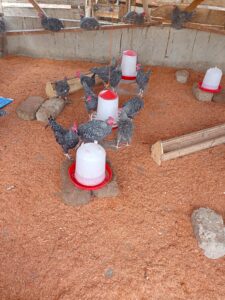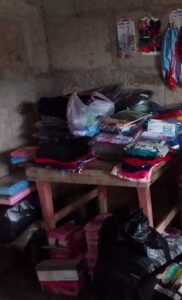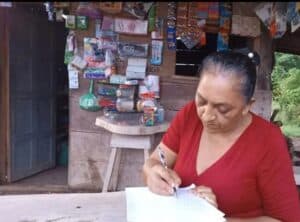
The Fight Against Fall Armyworm Infestation, Part III: The Value in Farmer Education And Hands on Training
Story by: Bernard Frimpong Bannor

“Last season, armyworm attacked my 2 acre maize farm. It was scary. I’ve been farming for the past 10 years, and I’ve never seen this kind of damage before,” said Awinpanga Adams, a 38-year-old maize farmer in Beposo. “Upon the advice of a co-farmer, I sprayed a pesticide and the pesticide killed all my maize plants”
In March 2018, Self-Help International’s Young Adult Training Center (YATC) team started conducting training needs assessment of 75 farmers in 10 communities in three districts in Ghana’s Ashanti Region to identify major challenges affecting their operation. These communities included Fankamawe, Nkontomire, Nyame Bekyere, Kyereyase, Adankwame (Atwima Nwabiagya District), Ama Badu, Bedabour, Beposo, Kukubuso (Atwima Mponua District), and Timeabu (Ejisu-Juaben Municipal).
They discovered that fall armyworm infestation is a common technical challenge affecting maize farming in these communities. Most of the farmers previously had very little knowledge about armyworm, and they were full of misconceptions. They expected the government to intervene to eradicate it.
Unfortunately, Self-Help’s Ghana team had to tell farmers the hard truth: fall armyworm can’t be immediately eradicated and the current situation is expected to get worse. The armyworm invasion can only be managed. The Food and Agriculture Organization of the United Nations (FAO) has said that fall armyworm is expected to spread further in Africa due to its biological characteristics and the high volume of trade between African countries.
In order to address this challenge, the key strategy of the YATC team was to focus on community participation and an interactive learning approach to create holistic community awareness, monitoring and controlling of fall armyworm. The idea was to build the capacity of farmers to be able to monitor and identify fall armyworm during the early stages of infestation, as well as understand the different stages of fall armyworm’s growth cycle. To control fall armyworm, farmers needed to be familiar with the basic biology of fall armyworm, and they needed to know how to detect an infestation. They needed to learn how to monitor it and understand the extent of damage in the perspective of their production systems so they could take appropriate precautionary and responsive actions based on their assessments.

The training methods used by the team included community demonstrations, presentations, field trips, and group discussions. The most basic component of the training was to set up community and school farming demonstrations where farmers put the improved methods into practice. When setting up the 10 community farming demonstrations, Self Help International provided all of the necessary farm inputs such as herbicides, fertilizers, pesticides, and seeds. Communities donated one acre of land each for the demonstrations.
Through the farming demonstration, Self-Help International’s Ghana team was able to build the capacity of over 300 people (including farmers, school children, and primary school teachers) to analyze their community maize production systems, identify problems, and offer appropriate remedial measures during a fall armyworm infestation.
Now, farmers have more knowledge about managing fall armyworm. During the same time last year, there were thousands of acres of maize destroyed by fall armyworm. This year the situation is different, and there haven’t been any reports of losses resulting from fall armyworm in the communities we serve.
This year, farmers have a good yield. It’s enough to eat and sell to make a profit and provide for their families. Before Self-Help’s YATC intervention, the average crop yield of participants was 3 bags (145kg) per acre. The average yield per acre has now increased to 8 bags (145kg). Amidu from Ama Badu harvested 40 bags on 5 acres and Nyamekye got 9 bags from an acre plot at Beposo. We expect the future production and profit of participants to further increase as they continue to adopt better agricultural practices.
Yields from school farms are equally good, ensuring enough of a regular supply of maize to provide breakfast for children. As children have enough food, school attendance will continue to be good and children will have the minimum protein needed for their growth and brain development.

 Next Post
Next Post


